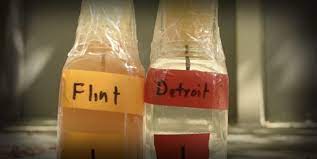Day two of the Khanya College Winter School (WS) dealt with water issues facing working class communities and the role played by women in dealing with water challenges.
WS Participants first watched a documentary that explained the water challenges in Flint, Michigan in the US. In 2014, to cut costs the Flint city council authorised the public’s water source switch to the Flint River. As soon as this happened the community started reporting changes to the water’s colour, smell and taste. But city officials kept saying the water was safe.
Today working class communities in South Africa continue struggling with the same situation. The community of Hammanskraal had been consuming polluted water and had water scarcity for over a decade.
WS Participants then worked in groups to discuss the struggles of water within our communities and organisations. “Women have to walk a distance to go fetch water,” said Nokuthula Mamana, from The Water Crisis Committee in the Eastern Cape, in reference to the question posed of what role women play in actions and struggles for water.
Water scarcity limits access to safe water for drinking and for practicing basic hygiene at homes, schools, clinics and working class organisations and it generates sanitation problems. “At schools, we cannot keep children if there is no water for hygiene purposes and to also avoid dirty toilets,” said Noluthando Xaba from Rene Le Lona, a Children’s Drop-in Centre in Soweto, Gauteng.
The Flint water crisis had a huge impact – the poison in the water led to Legionnaire’s disease, which killed more than 10 people, and 10,000 people were exposed to this and other illnesses. The cholera outbreak in Hammanskraal has resulted in over 20 deaths and the President admitted that the government has failed the Hammanskraal community.
The struggle of water continues everywhere but especially in our communities. Comrade Maria Van Driel asked a very important question “How do we organise ourselves community to organise water within the community for everyone?”
This article was submitted on 24 July 2023. You may republish this article, so long as you credit the authors and Karibu! Online (www.Karibu.org.za), and do not change the text. Please include a link back to the original article.


 Download PDF
Download PDF
